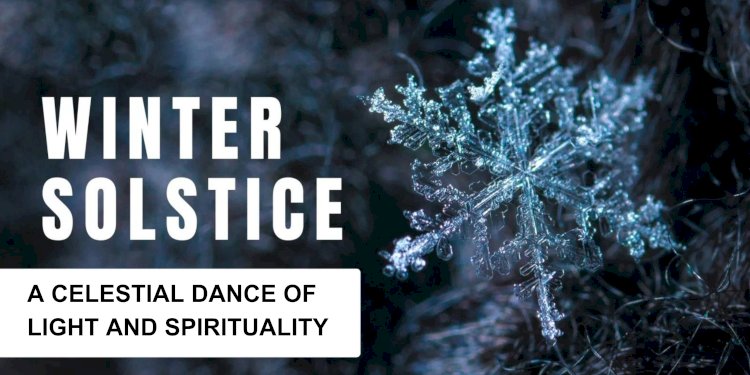Embracing the Winter Solstice: A Celestial Dance of Light and Spirituality
The Winter Solstice, occurring annually between December 20th and 23rd in the Northern Hemisphere, marks the shortest day and longest night of the year due to the Earth's axial tilt. Beyond its astronomical significance, this celestial event has been celebrated across cultures for centuries. Ancient civilizations, including the Norse and Chinese, held festivals symbolizing the triumph of light over darkness and the promise of renewal. In modern spirituality, the Winter Solstice remains a time for reflection, connection with nature's cycles, and various rituals. As the longest night unfolds, it serves as a poignant reminder of the interconnectedness of all life, inviting individuals to find solace, hope, and a renewed appreciation for the enduring spirit of light.
By Shreya Rajvanshi Gangal

As the days grow shorter and the nights longer, the world enters a magical moment known as the Winter Solstice. This celestial event, marking the shortest day and longest night of the year, has been celebrated across cultures for centuries. Beyond its astronomical significance, the Winter Solstice holds a profound spiritual resonance for many, symbolizing hope, rebirth, and the triumph of light over darkness.
Why Does the Winter Solstice Occur?
The Winter Solstice occurs annually between December 20th and 23rd in the Northern Hemisphere when the axial tilt of the Earth reaches its maximum, causing the Sun to appear at its lowest point in the sky. This phenomenon results in the shortest day and longest night of the year. In the Southern Hemisphere, the Summer Solstice takes place during the same period, when the Sun reaches its highest point in the sky, marking the longest day and shortest night.
The Earth's axial tilt, approximately 23.5 degrees, creates the changing seasons as different parts of the planet receive varying amounts of sunlight throughout the year. During the Winter Solstice, the Northern Hemisphere leans away from the Sun, leading to colder temperatures and the arrival of winter.
Cultural and Spiritual Significance
-
Ancient Celebrations:
- Many ancient civilizations recognized the Winter Solstice as a pivotal moment in the cyclical nature of the seasons. The ancient Egyptians, Greeks, and Romans, as well as indigenous cultures worldwide, held festivals and rituals to honour the sun's rebirth and the promise of longer days to come.
-
Yule in Norse Tradition:
- Norse traditions celebrated Yule, a festival lasting for twelve days around the Winter Solstice. This festival was marked by feasting, the burning of the Yule log, and the exchange of gifts. Yule symbolized the rebirth of the sun and the triumph of light over darkness.
-
Winter Solstice in Modern Spirituality:
- Today, the Winter Solstice continues to hold spiritual significance for various modern belief systems. In Pagan and Wiccan traditions, it is a time for reflection, renewal, and connecting with the cycles of nature. Many spiritual communities celebrate with rituals, meditation, and ceremonies focused on embracing the return of the light.
-
Chinese Dongzhi Festival:
- In Chinese culture, the Winter Solstice, known as Dongzhi, is a time for family reunions and feasting.It is a time to harmonise with the balance of nature by symbolizingg the restoration of yin, or darkness, giving way to yang, or lighe.
Conclusion
The Winter Solstice is a celestial spectacle that transcends scientific understanding, weaving itself into the fabric of human culture and spirituality. As we gather around the warmth of our hearths and reflect on the changing seasons, the Winter Solstice serves as a reminder of the interconnectedness of all life on Earth. In the quiet and stillness of the longest night, we find solace and hope, embracing the promise of renewal and the return of the light. Whether through ancient traditions or contemporary ceremonies, the Winter Solstice invites us to connect with the rhythms of nature and celebrate the enduring spirit of light within and around us.
What's Your Reaction?



















